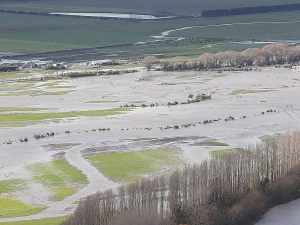ACC backs young farmers with FMG Young Farmer of the Year partnership
The Government has announced that ACC will be a sponsor of this year's FMG Young Farmer of the Year competition.
 Eligibility criteria for funding from the Canterbury Flood Recovery Fund are a barrier to some farmers receiving funding, says MP for Selwyn Nicola Grigg. Photo Credit: ECan Media Team
Eligibility criteria for funding from the Canterbury Flood Recovery Fund are a barrier to some farmers receiving funding, says MP for Selwyn Nicola Grigg. Photo Credit: ECan Media Team
Nearly four months on from the floods that devastated much of rural Canterbury, the Government has fallen short of the promises it made to local farmers, says National MP Nicola Grigg.
“Jacinda Ardern and Damien O’Connor flew into Ashburton with cameras rolling to announce a $4 million Canterbury Flood Recovery Fund – indicating that it was just a start, that they were still working to establish the full scale and cost of the damage – and that there would be more where that came from,” says Grigg who is MP for Selwyn.
She says the fund offers grants of up to 50% of eligible costs with a total limit of $250,000 and will contribute to uninsurable costs to enable productive land to return to a productive state as quickly as possible.
“Essentially, it can only be used for the clearing up of flood debris such as boulders, gravel, trees, and silt on productive land. Insurable costs, such as replacing fences, have not been targeted by the fund.”
“Four months on and the Ministry for Primary Industries (MPI) has received 168 applications for support, with a total monetary value of $8,029,535.
“To put the number of applications into perspective there are over 550 properties in the ArcGIS survey database, suffering varying degrees of damage.
Grigg says that the criteria set for the fund requires 51% of income to be from the primary industries, meaning lifestyle blocks listed in the database were ineligible.
She claims that some listed in the database as sheep or beef farms have other income streams, including tourism and rental properties which exclude them from applying because they don’t meet the 51% threshold.
“In my view, that absolutely stinks. The Government set a criteria that was very difficult for highly-stressed, overworked and exhausted farmers to meet,” she says.
She says that while MPI has accepted 82 applications, they’re only paying $1,428,964 to those farmers and have declined a further 38 applications on the ground they don’t meet the eligibility criteria.
“And therein lies the problem – the eligibility criteria is far too strict and, therefore, discounts hundreds of affected farmers and landowners. The monetary value of the applications alone indicates the Government is way off target.”
Grigg says that O’Connor needs to instruct MPI to loosen its eligibility criteria and get the money to the farmers most in need.
The World Wide Sires National All Day Breeds Best Youth Camp Best All Rounder plaudit has become family affair, with 2026 Paramount Cup winner Holly Williams following in her sister Zara's footsteps.
DairyNZ is giving New Zealand farmers a unique opportunity to gain hands-on governance and leadership experience within the dairy sector.
Herd improvement company LIC has posted a 5.2% lift in half-year revenue, thanks to increasing demand for genetics.
According to the latest Fresh Produce Trend Report from United Fresh, 2026 will be a year where fruit and vegetables are shaped by cost pressures, rapid digital adoption, and a renewed focus on wellbeing at home.
The Roar is a highlight of the game hunting calendar in New Zealand, with thousands of hunters set to head for the hills to hunt male stags during March and April.
OPINION: The past few weeks have been tough on farms across the North Island: floods and storms have caused damage and disruption to families and businesses.

OPINION: Meanwhile, red blooded Northland politician Matua Shane Jones has provided one of the most telling quotes of the year…
OPINION: This old mutt has been around for a few years now and it seems these ‘once in 100-year’ weather…